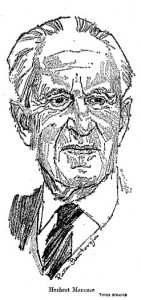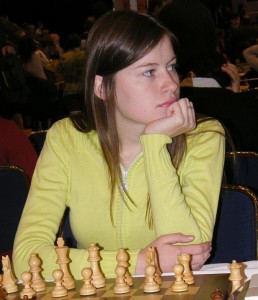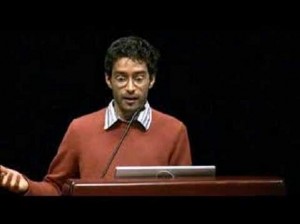October, 2010
Deserter's Songs, New in Ceasefire - Saturday, October 23, 2010 17:59 - 0 Comments
Deserter’s Songs – Bye Bye Binaries (Music and Żal)

In this week's Deserter's Songs column, David Bell considers the way in which music can cut across binary distinctions, and considers a Polish term which may help us understand the complex, contradictory emotions that music can throw up.
In Theory, New in Ceasefire - Friday, October 22, 2010 15:21 - 11 Comments
In Theory – Herbert Marcuse: One Dimensional Man?
 Marcuse's One-Dimensional Man was written in 1962, but much of it reads as if it could have been written today. In a forensic and robust re-assessment, political theorist Andrew Robinson highlights the merits, and lacunae, of this pivotal work.
Marcuse's One-Dimensional Man was written in 1962, but much of it reads as if it could have been written today. In a forensic and robust re-assessment, political theorist Andrew Robinson highlights the merits, and lacunae, of this pivotal work.
Chess Corner, New in Ceasefire - Thursday, October 21, 2010 20:27 - 2 Comments
Chess Corner – It’s a (chess) man’s world: Natalia Pogonina interviewed
 In this week's Chess Corner, Paul Lam interviews Natalia Pogonina, one of the chess world's female superstars and a three-times European Champion. The interview touches upon her beginnings, her ambitions and the female presence in a game long dominated by men.
In this week's Chess Corner, Paul Lam interviews Natalia Pogonina, one of the chess world's female superstars and a three-times European Champion. The interview touches upon her beginnings, her ambitions and the female presence in a game long dominated by men.
New in Ceasefire, The Unveiled Truth - Wednesday, October 20, 2010 22:14 - 3 Comments
The Unveiled Truth: The importance of being M.I.A.
 In this week’s column, Shirin Sadeghi takes a look at the case of M.I.A., who made headlines this week when, at an awards show, she appeared on the red carpet with a highly stylized but completely covering abaya and niqab. As Sadeghi shows, what makes M.I.A.’s work, in its visceral impact, so important is that it forces both the “East” and the “West” to face, and know, each other.
In this week’s column, Shirin Sadeghi takes a look at the case of M.I.A., who made headlines this week when, at an awards show, she appeared on the red carpet with a highly stylized but completely covering abaya and niqab. As Sadeghi shows, what makes M.I.A.’s work, in its visceral impact, so important is that it forces both the “East” and the “West” to face, and know, each other.
Diary of a Domestic Extremist, New in Ceasefire, Politics - Wednesday, October 20, 2010 11:42 - 0 Comments
Diary of a Domestic Extremist: The Final Cut?
 The Con-Dem cuts, the latest attempt to dismantle the welfare state, will see massive, catastrophic changes to the social make up of the country. In his latest column, Mikhail Goldman says the fightback already under way can stop the unfolding disaster, but only through unity, courage and an awareness of past mistakes.
The Con-Dem cuts, the latest attempt to dismantle the welfare state, will see massive, catastrophic changes to the social make up of the country. In his latest column, Mikhail Goldman says the fightback already under way can stop the unfolding disaster, but only through unity, courage and an awareness of past mistakes.
Modern Times, New in Ceasefire, Politics - Tuesday, October 19, 2010 22:30 - 1 Comment
Modern Times: Is the anti-deportation movement waiting for its Rodney King?
 In this week's Modern Times column, Corin Faife looks at the case of Jimmy Mubenga, who died a few days ago during his attempted deportation as a result of excessive force. Faife reminds us that Mubenga's plea to his impassive fellow passengers, “what kind of people are you that do nothing?”, must act as a wake-up call to all of us.
In this week's Modern Times column, Corin Faife looks at the case of Jimmy Mubenga, who died a few days ago during his attempted deportation as a result of excessive force. Faife reminds us that Mubenga's plea to his impassive fellow passengers, “what kind of people are you that do nothing?”, must act as a wake-up call to all of us.
New in Ceasefire, South of The Border - Monday, October 18, 2010 0:00 - 0 Comments
South of the Border The view from Latin America
 In the news this week in Latin America: Chile celebrates a happy ending to the miners' saga, Chavez and Medvedev sign a nuclear agreement, catastrophic rains in Nicaragua and much more. Ceasefire correspondent Tom Kavanagh delivers his weekly round up of what's been going on south of the border.
In the news this week in Latin America: Chile celebrates a happy ending to the miners' saga, Chavez and Medvedev sign a nuclear agreement, catastrophic rains in Nicaragua and much more. Ceasefire correspondent Tom Kavanagh delivers his weekly round up of what's been going on south of the border.
Books, New in Ceasefire, Science - Sunday, October 17, 2010 22:18 - 6 Comments
Book Review True Enough: Learning to live in a post-fact society
 Is the mainstream media biased? Do you find its bias to be always against your own opinions and views? Is this a coincidence? In this Month's science column. Sebastian Meznaric takes a look at a recent book, 'True enough' by Farhad Majoo, that aims to uncover how humans interpret and detect bias in the information they receive, with surprising results.
Is the mainstream media biased? Do you find its bias to be always against your own opinions and views? Is this a coincidence? In this Month's science column. Sebastian Meznaric takes a look at a recent book, 'True enough' by Farhad Majoo, that aims to uncover how humans interpret and detect bias in the information they receive, with surprising results.
Deserter's Songs, Music & Dance, New in Ceasefire - Saturday, October 16, 2010 8:19 - 9 Comments
Deserter’s Songs: The shape of education to come?
 In this week's Deserter's Songs column on music and politics, David Bell considers the relevance of free improvisation for a 'new way of making and living education'. In so doing, he examines the resonances between the practice of free improvisation and what is commonly termed 'critical pedagogy'.The similarities, he contends, are startling.
In this week's Deserter's Songs column on music and politics, David Bell considers the relevance of free improvisation for a 'new way of making and living education'. In so doing, he examines the resonances between the practice of free improvisation and what is commonly termed 'critical pedagogy'.The similarities, he contends, are startling.
New in Ceasefire, Sabir on Security - Friday, October 15, 2010 20:10 - 2 Comments
Sabir on Security – The 7/7 inquest: we need answers not a whitewash
 This week, more than five years after the events, an official inquest has been launched into the London bombings of 7/7. As Rizwaan Sabir shows in his latest column, an inquest might answer some of the questions, but only a public inquiry can ensure the right lessons are learnt
This week, more than five years after the events, an official inquest has been launched into the London bombings of 7/7. As Rizwaan Sabir shows in his latest column, an inquest might answer some of the questions, but only a public inquiry can ensure the right lessons are learnt

